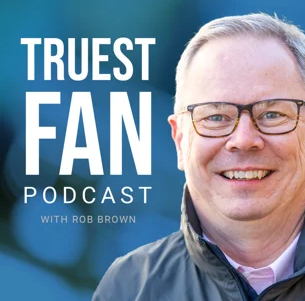Inspiring Your Team through the Power of Leadership
Share:
The latest episode of the Truest Fan Podcast is all about the importance of great leadership when it comes to building a successful team. Co-hosts Rob Brown and Phil Calandra share their insights on this topic, which was inspired by a listener’s inquiry on how to improve team performance.
In today’s world, with everything that’s going on around us, there’s an unusual amount of tension and uneasiness. So it’s crucial to assess how these factors are affecting your team members. As a business leader, you may not always be the one handling client inquiries and concerns – that’s where your team comes in. So, when they feel overwhelmed by these challenges, it’s up to you to step up and provide strong leadership.
Remember, your team’s reaction to challenging times is heavily influenced by how you respond. When you appreciate and value your team, it motivates them to do their best and work towards achieving success. That’s why practices like daily scrums and leadership by walking around can make a big difference in strengthening teamwork and overall business operations.
Podcast highlights the importance of regularly recognizing team members, the impact of steady leadership, and the benefits of implementing daily routines for fostering better teamwork. So, give it a listen and take away some valuable insights on how to lead your team to success!
Start the 7-STEP “QUICK START” CHALLENGE
To listen, click the play button above. Or click the “Subscribe” button to go to your favorite podcast player.
Show Highlights
Resources
Important Links
Quotes
- "The more you appreciate and show gratitude to the people that are there to support you, the more it reinforces the habit of leadership." -Phil Calandra
- "We don't grow when things are easy, we grow when we face challenges." -Phil Calandra
- "Whenever your team hears horror stories about lousy markets or other chaotic things, this is the time when you have to be a truest fan and step into leadership." -Rob Brown
Podcast Transcript
Rob Brown (00:04):
What’s your version in your team as a leader of walking around to the people on your team acknowledging how important they are to the work that you do, and letting them know that you’re rooting for their success? I think that’s a simple pick me up sort of phrase or idea that can be part of that leadership by walking around.
Phil Calandra (00:26):
So think of it in terms of what can I learn? How can I level up? How can I grow, because we grow more when the challenge is in front of us than when it’s easy in front of us.
Intro (00:44):
You’re listening to the truest fan podcast. And now here’s your host, Rob Brown. Hello, again, and
Phil Calandra (00:54):
welcome back to another edition of the truest fan Podcast. I’m Phil Calandra. And I’m with my partner in crime, Mr. Rob Brown. Hi, Rob. Hey, Phil,
Rob Brown (01:06):
great to be with you.
Phil Calandra (01:07):
Good to see you. We’ve got an interesting topic for today. And this really comes from a couple of weeks ago, we had a listener of our podcast, a regular listener, messaged us and and wanted to some talk or a riff or some detail on team building, and actually functioning as a team. And you know, when you think about that topic, Rob, how appropriate is it right now, with everything that’s going on, not just to our clients and around our communities, but in the four walls of our offices inside our firm, just as we think that clients are uneasy about the news and about the economy and inflation? How do our team members, our teammates, reply, or respond to the same type of chaos? And that was the subject of this question. I think it’s really perfect.
Rob Brown (02:03):
Yeah, I think it absolutely is. Because you know, as advisors, you may not always be the person on the front line of those conversations that come in as questions that come in from clients or prospective clients. It may be somebody else on your team, who doesn’t feel prepared to answer those questions. And that person is hearing about everything that’s going on in the world. They know the markets suck. They hear about inflation and interest rates, they hear about layoffs, and indictments. And they’re hearing all this stuff. And they’re kind of on the front line, maybe getting some questions from clients who just want a little bit of insight and and then a question, you know, well, how are things really, you know, is my job safe? You know, right. And their horror stories if they can go back to and remember from other lousy markets where things happened, and that’s where leadership on your team and being a truest fan, to your teammates, as a leader becomes so important.
Phil Calandra (03:12):
Yes, that’s absolutely right. And when I think of that word, leadership, Rob, I’ve always learned this, I know this intuitively being a business leader. Leadership is about people. Management is about process. So this conversation, you have to as the firm owner, as the financial advisor, or the lead advisor, you have to raise yourself to the level of leader, not manager of leader, and understand that your team is going to respond the way you respond. Your team is going to react, the way you react. I know in my office, we regularly have this conversation, Chris Allen, Trish Davis and myself. And it does kind of hit home, which we talked about in a previous episode kind of our philosophy, the way we view the world, our signature solution, if the phone rings, and a question is asked of Trish or Chris Allen, you know, they’re not going to give financial advice, but they have to have some grounding or some relevance in how is Phil typically going to respond before they set the appointment or they put them on the phone. And that just comes from good communication. We’re going to share with you some tools that we use regularly, but leadership again, it’s about people, and the team is going to accomplish a whole lot more right? What’s the acronym for team together? Each accomplishes more. So you have to have the team kind of built around this and that’s very tough. To your point when you think about what’s being said in the news on a daily basis, right? layoff after layoffs. So how many people in your office in your firm that You’re the leader of are worried, you know, is the financial strife in the economy, potentially costing my job?
Rob Brown (05:08):
Yeah, I think that’s I think that’s really important. And it sounds maybe like a daunting task to be a better leader on a day to day basis. It really doesn’t have to be, although I think it’s important, as Phil said, to distinguish between the difference between management and leadership, I remember when I took a leadership role a number of years ago, overseeing a bunch of advisors and their teams that I implemented us an acronym that was called management by walking around, I think it may have even been a book back in the in the dark ages, but maybe for today’s purposes, it’s not management by walking around. It’s leadership by walking around. That’s the whole idea. Isn’t isn’t to just like, barely peek your head in the door and say, you know, hey, Phil, how you doing? It’s opening the door to Phil’s office and saying, Hey, Phil, I see you’re not on the phone, and you don’t have a meeting on your calendar. Can I sit down and talk with you, and have a very insincere conversation about how you’re feeling? Whether you’re Phil, the adviser or Chris Allen, you know, the client service person on the team? You know, how are you feeling? You know, you know, there’s a lot going on, are there any worries that you have, and just having some open ended questions and conversations, and just doing that on a regular basis. And depending on the size of your team, if you have a small team, you could do that, you know, every day or you know, a couple of times a week, if you have a big team, you may have to spread it out. But just just leadership by walking around by taking the time to sit down with people on your team and understanding what their pulse is. And then let’s fill suggested matching that pulse up against where you as the leader think they should be, so that they can be at the best, as they’re interacting with the rest of the team, or they’re interacting with clients. And I guess maybe the closest point out Phil, is probably not a whole lot different than taking a little extra time with your clients. during times like this to do an extra webinar or to make some extra outgoing phone calls or to send some extra emails, you’re taking care of your clients by walking around in those formats. This is just literally walking around and saying, Hey, let’s talk how are things? It’s such a simple leadership premise that I think can make a huge difference.
Rob Brown (07:51):
Are you ready to discover your true purpose, live with impact and build an ever greater legacy, then you need to make time for what truly matters most go to truest fan.com/challenge To begin the free, truest fan seven day Quickstart.
Phil Calandra (08:14):
That’s such a strong point too. And I think something that I always have to work on. I can’t say that I’ve mastered this Rob. And that is kind of the art of appreciating your team, showing gratitude to your team. As a firm owner, as an advisor, business owner, entrepreneur, I’m 110% a driver, I don’t rest until I have success or greatness in my own view of the goals that I set. But when we take the time to, to let our team know that we value them in your leadership example and just walking around asking them how they feel. But give them feedback as well. Let them know that you value them inspires people inspires everyone to continue to do the very best they can when they know that they’re valued when they know that they’re appreciated. And I’m here to tell you, I don’t always get that right, as a firm owner, as a business person. And I think we all could work on that better. And the more we do that, the more we appreciate our team and show gratitude for the people that are there to support you and help you drive and row this boat towards success. The more it reinforces the habit of leadership, it reinforces and it helps the team accomplish more. I think it’s just something that we at least for me something that I know that I’ve got to consciously work on. Appreciation recognition goes a long, long way.
Rob Brown (09:53):
Yeah, you know, we close this podcast and a bunch of our emails with the expression rooting for your success. As I mean, what’s your version and your team as a leader of walking around to the people on your team acknowledging how important they are to the work that you do, in letting them know that you’re rooting for their success, I think that’s a simple pick me up sort of phrase or idea that can be part of that leadership by walking around. So it’s, it’s not, you know, in, by the way, leadership by walking around, you could work on problems that a team member may be having. There’s lots of different ways that you can use that this tool, this concept in different environments, but right now we’re kind of focusing on a things may not be going smoothly, in general. And let’s, let’s bring it into focus. So we’re all operating on the same platform.
Phil Calandra (10:51):
Right? Well, and I think as human beings, we all have some similarity in the fact that we don’t grow. As people as human beings, we don’t grow and get better, when things are easy. We grow when we face challenges. We grow as a team, you grow as a firm, you grow as a financial professional, in times like these three years of chaos, since COVID. I mean, it just keeps coming and coming and coming. And you better believe that your team is facing that chaos, too. So think of it in terms of what can I learn? How can I level up? How can I grow, because we grow more when the challenge is in front of us than when it’s easy in front of us.
Rob Brown (11:39):
Right? That’s another great point. And that reminds me of another tool that we use in our AUM Launchpad process that we call a daily Scrum or a daily stand up meeting or a daily powwow, although maybe powwow is not politically correct, these days. But just the whole idea that each day, you spend 15 to 30 minutes at the most, but usually about 15 minutes with your team. If it’s virtual, you can do it online. But if it’s in person, it’s like right before lunch or right after lunch, not during lunch, where you have a stand up meeting. And you invite each person on the team to do three things, talk about the most important things they’re working on, or have accomplished in the last 24 hours. Second, the most important things that they’re working on in the current day. And third, what they might need help with or that they could offer another team help with. If you have a meeting where you go around and you ask each person to answer each of those questions or address each of those points. One by one, you can have a great stand up meeting. And it’s a great way of building teamwork.
Phil Calandra (13:01):
Yeah, I don’t know that I like the word Scrum. But I get it because maybe that’s a that’s a rugby term. And rugby, Hertz, right? That’s, that’s a bloody sport. But right, so the scrum, or the stand up meeting. And we started doing these a number of years ago, when our firm was large. And it does work. Because what it ends up doing is it fosters this openness and this communication amongst the team members. And as the firm leader, as the, you know, the person that’s driving the growth and the behavior that you want to see in your firm, it allows you to hear different perspectives, and what somebody may be struggling with. What’s the one thing today that you need help with? That was always for me, as the leader of our firm, that was always the most telling, not question answer, that I would tune into really keenly. Because I knew if there was something that somebody else on the team could provide the support the other, then we’re going to have much better results. We’re gonna have much better clients, we’re gonna have much happier clients, and at the end of the day, that’s why we do what we do. So I love that.
Rob Brown (14:19):
Yeah. And you know, I’ve helped teams implement scrums, or stand up meetings over the years. And invariably, and maybe some of the listeners on this podcast who are hearing this idea or thinking, gosh, that’s the last thing I want is another meeting. And you’re telling me to have it daily? Yes, that’s exactly what I’m saying. How because I have never worked with somebody who did a proper implementation of a daily scrum, stand up meeting powwow, whatever you want to call it, whose team didn’t get better, because they did it. Leadership came out problems were addressed. There were more attaboys going on, people were helping each other out. because they knew what people needed help with.
Phil Calandra (15:02):
Yeah, and it’s only three. It’s only three questions. It’s only soliciting information in around three key areas. If you want to learn more about scrums, stand up meetings, go into the show notes we’ll put in there, right Rob, you’re gonna upload that for us. Right? download that information and give it a shot. What do you have to lose? I’ll tell you what you have to gain. And that’s the elevation of you as a team leader. And at the end of the day, together each accomplishes more. Please like our podcast, share it with others. We’d love doing this for you on a regular basis. But keep the notes and messages coming. If there are topics you’d like for us to tackle. We’d be happy to do that. Share this with others. And as always, we continue to look for areas to improve. So as we always say, We’re rooting for your success. That’s why we do what we do. With that. I look forward to being with you again. Till next time. Take care


